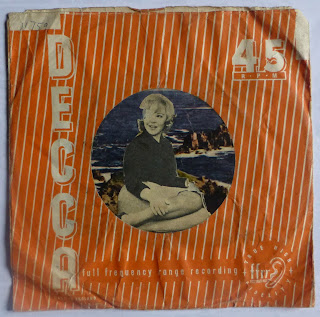KATHY KIRBY "SECRET LOVE" To Conceal Or Reveal
Home-made
record sleeves.
 This
example comes from the early 60's. The teenage market is expanding;
pop star life story mags are cheap and plentiful, encouraging
identification with performers who increasingly share a background
with their audiences. Pop ( we call it Pop by now ) is part of a
rite; the big labels form a megalith within which we dance, fight and
grope. Record packaging lags behind other commodities; Lps and Eps
come in attractive sleeves, but 45's are plainly packaged; grey text
on monochrome labels, the green of the Columbia label had echoed the
livery of corporation buses. Company sleeves are standardised and
come in single colours, some have adverts on the back for the company
catalogue, or for gramophones and hairdryers.
This
example comes from the early 60's. The teenage market is expanding;
pop star life story mags are cheap and plentiful, encouraging
identification with performers who increasingly share a background
with their audiences. Pop ( we call it Pop by now ) is part of a
rite; the big labels form a megalith within which we dance, fight and
grope. Record packaging lags behind other commodities; Lps and Eps
come in attractive sleeves, but 45's are plainly packaged; grey text
on monochrome labels, the green of the Columbia label had echoed the
livery of corporation buses. Company sleeves are standardised and
come in single colours, some have adverts on the back for the company
catalogue, or for gramophones and hairdryers.
The
Machineshop Overall Blue of the Decca label always looks capable of
nullifying any colour in the recorded performance within, and the
orange stripey sleeves have the utilitarian feel of a bag for
woodscrews or rawl plugs, or a packet of sandpaper.
 In
inspired defiance of this, the owner of this copy of Kathy Kirby's
"Secret Love" has collaged a fanmag clipping of Kathy and
a tinted seacape from an ad and stuck it on the inside of the sleeve,
positioning it perfectly within the hole in the bag. Over the years
the cut out figure has lost a bit of face and a hand, as might a
piece of statuary, or a neglected memorial.
In
inspired defiance of this, the owner of this copy of Kathy Kirby's
"Secret Love" has collaged a fanmag clipping of Kathy and
a tinted seacape from an ad and stuck it on the inside of the sleeve,
positioning it perfectly within the hole in the bag. Over the years
the cut out figure has lost a bit of face and a hand, as might a
piece of statuary, or a neglected memorial.
Originally
sung by Doris Day, "Secret Love" is a sweet tale of
inhibitions overcome. It was Kathy's biggest hit and her best record. In her hands the
song is helpless. From her launch at 00.02 it's fate is sealed,
like that of a butterfly straddling a Luna space rocket. At 00.20 Kathy lands the rocket, plants a flag in the
saturday night telly schedules and as the arrangement subsides into a
twist beat that is half Northern Dance Orchestra and half Clip-joint
sleaze ,she sees the future; she will sing this song forever and her
audience will always come to stand in her slipstream.
The
back of the collage shows an ad for Phensic, a popular headache cure.
As
people's lives move on, or stop, their record collections return to a kind of
circulation. Some from this era change hands immediately, snapped up by friends or
bought online and in the hipper shops by a new generation. Others join a glacial procession around the record fairs; some fragments of the megalith rise bare and
battered in the charity shops, their grooves full of Mother's Pride toastcrumbs and the dust of ashtrays and bedsit carpets. The rest form a vast scaur of shellac and vinyl, accessible at low tide, relics of the pre-Beatle period.
It's
a tough world, as Kathy Kirby was to find. But here at least the private devotion of a fan has emerged, sending a signal from that blasted, flattened jurassic coast of British Light Programme Pop, that herein is
something that mattered, enabling it to matter again.


Comments
Post a Comment